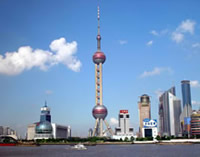|
|


ADVERTISEMENT
Buy Your own advertising
spaces!
.
Download Adobe Acrobat Reader to open [PDF] files.
Recent Visitors
In foreign lands, it can be polite to be rude occasionally
2009. 23 September
(english.people.com.cn)
On May 1 of 2010, the Shanghai World Expo will open. This event will serve as an unprecedented opportunity to engage in cultural exchange between the East and West. Will both cultures be ready for the impact they will have on each other, and will each culture be able to accept and appreciate the cultural etiquette the other takes for granted?
Before the Beijing Olympics, the municipal government prepared the city by distributing guidebooks to locals which included instructions on etiquette such as "How to smile." So far Shanghai has not undertaken such measures.
One thing that I've noticed after living in China for several years is that I still don't quite know what is polite and what isn't. For example, out of habit, I always say "Thank you" for small things, like when a waitress pours me a glass of water, or buying train tickets at the station. But my Chinese friends have constantly told me "Don't say that, it's not necessary." So I tried to be "rude." I would toss my money at people, and say nothing or grunt "Eh!" in response to anything they asked. This seemed like what I had seen my friends doing and I felt like it was what I should be doing too.
I realized, though, that it's the intentions behind what I'm doing that matter, and the cultural context of these situations remains somewhat elusive to me. I found myself quickly acting rude, yelling at people when they didn't have what I wanted, getting mad at service workers and even getting in an argument when I couldn't buy a student train ticket and I called the attendant buhexie (disharmonious), it seemed to really upset him. Lost in a cultural gap, I had become disharmonious myself.
When Shanghai, and many parts of China, once again become flooded with tourists wishing to experience Chinese culture, it will be important to avoid confusion about simple etiquette. For example, I found out after a while, as my Chinese classmates explained to me, that polite terms of address actually indicate distance in a relationship. Since there isn't yet a strong sense of guanxi (relations) between the two people, there's still a lot of polite rhetoric in order to create smooth relations that will eventually lead to a closer, more intimate and long lasting relationship.
That's the point, when a relationship is very close, like between colleagues, classmates, or a married couple, there is an implicit understanding of respect for each other which goes beyond words. In fact, from a Western perspective, sometimes the interaction can seem rude, "Get me this" or "Hurry up, you're making us late."
Another common Western practice when meeting others is to smile. In China and many Asian countries, however, this is not the case. I realized too, that it would be a mistake to assume that the other person is necessarily unhappy, discontent, or upset about the situation; it might simply mean nothing. Sometimes the opposite could be the case, that a smile might actually indicate a sense of discomfort for a Chinese person.
What will happen when several million people come to China, saying "Please," "Thank you" and smiling at everyone they meet? I think it's important that even such a simple thing as etiquette be part of the broader public relations and cultural exchange that the Shanghai World Expo will promote. It would be a good idea to explain to visiting guests that part of Chinese culture is to be very direct and frank with people.
It's important to look at etiquette from both perspectives. On the one hand, the Expo organizers and the efforts that are being put into it should take into account the attitudes of Westerners, especially how they might, incorrectly, view the attitude and actions of the Chinese people that they meet.
However, it's also important that foreigners also try and understand social interactions and not misunderstand situations or develop the wrong impressions about China simply because the sales clerk doesn't smile and say "Thank you" to them. An ability to understand and appreciate different cultures will be an important part of the Expo's success.
The author is an MA candidate studying international politics at the Johns Hopkins University- Nanjing University Center for Chinese and American
Source:english.people.com.cn


